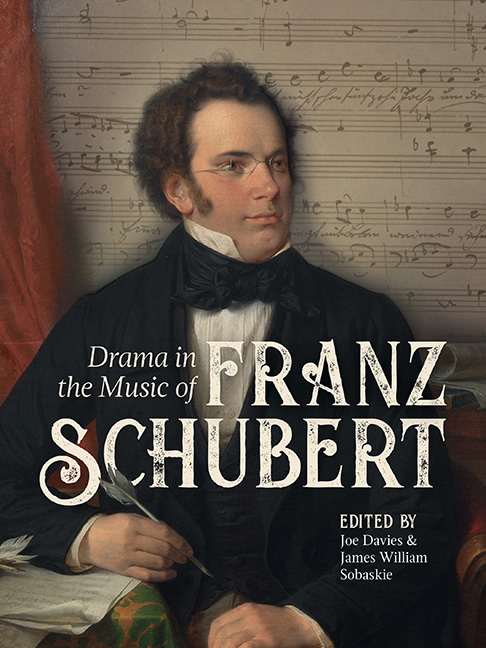Book contents
- Frontmatter
- Dedication
- Contents
- List of Figures
- List of Tables
- List of Contributors
- Acknowledgements
- Preface
- Introduction: Internal Dramas
- PART I STAGE AND SACRED WORKS
- 1 Opera that Vanished: Goethe, Schubert, and Claudine von Villa Bella
- 2 Pioneering German Musical Drama: Sung and Spoken Word in Schubert's Fierabras
- 3 The Dramatic Monologue of Schubert's Mass in Ab Major
- PART II LIEDER
- PART III INSTRUMENTAL MUSIC
- Select Bibliography
- Index
2 - Pioneering German Musical Drama: Sung and Spoken Word in Schubert's Fierabras
from PART I - STAGE AND SACRED WORKS
Published online by Cambridge University Press: 25 March 2020
- Frontmatter
- Dedication
- Contents
- List of Figures
- List of Tables
- List of Contributors
- Acknowledgements
- Preface
- Introduction: Internal Dramas
- PART I STAGE AND SACRED WORKS
- 1 Opera that Vanished: Goethe, Schubert, and Claudine von Villa Bella
- 2 Pioneering German Musical Drama: Sung and Spoken Word in Schubert's Fierabras
- 3 The Dramatic Monologue of Schubert's Mass in Ab Major
- PART II LIEDER
- PART III INSTRUMENTAL MUSIC
- Select Bibliography
- Index
Summary
Introduction
In the early decades of the nineteenth century, Italian works dominated operatic stages throughout Europe, but in the eyes of many German observers, they swerved from true drama and served only as a vehicle for vocal virtuosity. The confrontation between Italian and German conceptions of opera came to a head in December 1821 when the Italian impresario Domenico Barbaja leased the Viennese court theatres and produced mostly Italian operas, namely those of Gioacchino Rossini, gaining unprecedented success.
Ignaz von Mosel (1772–1844), deputy director of the Viennese court theatres from 1820, insisted in his ‘Essay on the Aesthetics of Dramatic Musical Composition’ of 1813 that, above all, dramatic music should involve the ‘heightened declamation and the powerful, vital, warm expression of the emotions that are to be found in poetry’. For Mosel, music was not to hold up the action, nor distract listeners by means of empty showmanship. In an earlier essay, ‘On Sung Drama’ (1807), the likeminded poet and playwright Heinrich Joseph von Collin (1771–1811) demanded the complete fusion of music and poetry, promoting the idea of a musical drama that could surpass other forms of theatre: ‘if opera grants us everything that drama does and surpasses the latter in delight, shall we complain about a catastrophe from which we will gain a lot? I am convinced that the dramatic art will necessarily arrive at this point and thus be brought to the highest degree of perfection’.
Schubert, who had begun to establish himself as a composer of stage music in 1820, certainly followed the lively debate between the supporters of emergent German Romanticism and those of Italian opera. While, under the wings of his teacher Antonio Salieri, he had modelled his early stage works on French and Italian comic opera, the young composer now joined the ‘German school’ and soon adopted the idea of an all-sung drama for his opera Alfonso and Estrella, D. 732, of 1822. But, disappointed by its rejection at the court theatre in 1823, he returned to the traditional model of French comic opera when he began work on his next opera Fierabras, D. 796.
- Type
- Chapter
- Information
- Drama in the Music of Franz Schubert , pp. 35 - 50Publisher: Boydell & BrewerPrint publication year: 2019



